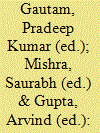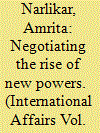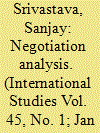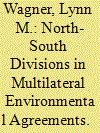|
|
|
Sort Order |
|
|
|
Items / Page
|
|
|
|
|
|
|
| Srl | Item |
| 1 |
ID:
146376


|
|
|
|
|
| Publication |
New Delhi, Pentagon Press, 2016.
|
| Description |
xix, 166p.hbk
|
| Contents |
Vol. III
|
| Standard Number |
9788182749092
|
|
|
|
|
|
|
|
|
|
|
|
Copies: C:2/I:0,R:0,Q:0
Circulation
| Accession# | Call# | Current Location | Status | Policy | Location |
| 058750 | 372.890954/GAU 058750 | Main | On Shelf | General | |
| 058751 | 372.890954/GAU 058751 | Main | On Shelf | General | |
|
|
|
|
| 2 |
ID:
120535


|
|
|
|
|
| Publication |
2013.
|
| Summary/Abstract |
The purpose of this special issue is to analyse the negotiation of power transition in the international system today. This introductory article provides the theoretical frame that guided all the contributors, and serves as the collective starting point for this project.
The framework focuses on three sets of issues. First, it highlights the importance of studying the relations between the key actors, rather than focusing solely on the perspective of any one group of players. It identifies five sets of key actors: the rising powers, the established powers, small and marginalized states, private actors (that attempt to harness the ongoing changes to their advantage and are in turn used by various state actors), and, finally, international organizations and other mechanisms of global governance (as loci, objects and also facilitators of international bargaining).
Second, the article facilitates an analysis of the relations between these actors; it offers the lens of negotiation analysis that focuses specifically on the variables of negotiation strategy, coalitions and framing.
Third, the article suggests potential implications of this collective study. These include new insights into the motivations of the key players, their ability and willingness to assume the responsibilities of international leadership, and how their visions of global order conflict with or reinforce each other.
The latter part of the article offers a summary of the findings, suggests how the individual contributions add up and presents some policy recommendations resulting from the analysis.
|
|
|
|
|
|
|
|
|
|
|
|
|
|
|
|
| 3 |
ID:
085724


|
|
|
|
|
| Publication |
2008.
|
| Summary/Abstract |
In this article, I address the question of negotiation analysis pertaining to the Cancun Ministerial of the World Trade Organization (WTO). Albeit, the deep differences between developed and developing countries on various trade issues could not be accommodated and the Cancun Ministerial finally collapsed, the coalitional diplomacy and the joint obstinate position taken by the developing countries were unparalleled and deserve concentrated analysis of negotiations and various strategies pursued during the Ministerial. The central contingent variable, in this study is the negotiation strategy pursued by the developing countries at Cancun. In more practical terms the coalitional diplomacy with special reference to the coalition of G-20 and distributive strategy used by the developing countries, have been investigated. Other derivative inquiries delineated here are: how developing countries adhered to and maintained their coalition G-20 at Cancun and the counter strategies of the developed world pertaining to moves made by the developing countries including endgame diplomacy.
|
|
|
|
|
|
|
|
|
|
|
|
|
|
|
|
| 4 |
ID:
077809


|
|
|
|
|
| Publication |
2007.
|
| Summary/Abstract |
This article analyzes negotiations in the United Nations Commission on Sustainable Development, the Framework Convention on Climate Change, and the Convention to Combat Desertification and focuses on discussions related to technology transfers from the North to the South. These transfers and the financial flows that the private sector could bring with it are closely related to what was believed to be a bargain reached in 1992 at the Rio Earth Summit. During subsequent negotiations, delegates from developed and developing countries have followed a fairly predictable 'script' on these issues - developed countries generally insist that the private sector, as the owner of the technology, must be involved in its transfer, while developing countries have insisted the governments of developed countries should honor their past commitments and promote these transfers. This study describes the development of the script under the three negotiating bodies at Rio, examines the variables that have contributed to the development of the script and, based on this analysis, identifies opportunities to move the talks forward
|
|
|
|
|
|
|
|
|
|
|
|
|
|
|
|
|
|
|
|
|